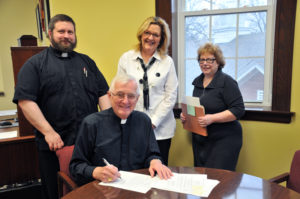By Barb Arland-Fye
The Catholic Messenger
DAVENPORT — The Diocese of Davenport’s Marriage Tribunal has granted its first shorter process annulment, responding to Pope Francis’ desire for swifter access to the church’s justice and mercy.

Bishop Martin Amos signs the first shorter process annulment in the Diocese of Davenport on Feb. 2. Also with bishop are Father Paul Appel, judicial vicar; Beth Blough, tribunal auditor; and Kathy Lanztky, tribunal secretary.
“While this shorter process cannot be used in all instances, the procedure does address the pastoral need to move these annulment cases along while respecting the integrity of the sacrament of marriage,” Bishop Martin Amos said. He signed the decree for the first short form annulment Feb. 2, 2016.
Last fall, Pope Francis released two documents pertaining to the Catholic Church’s marriage annulment procedures with the intention of creating a more pastoral process completed in a timelier manner. The shorter process annulment is one piece of the Holy Father’s reform of marriage annulment procedures. In the Davenport Diocese the shorter process is completed in approximately two months, if the paperwork is submitted properly. That compares to approximately 14 months for an annulment requiring more in-depth investigation.
The Holy Father, who has made marriage and family issues a centerpiece of his papacy, doesn’t intend for this quicker process to create a drive-through-restaurant mentality. Granting a short process annulment will be more the exception than the rule, says Father Paul Appel, judicial vicar of the Davenport Diocese’s Marriage Tribunal.
“The shorter process is designed only for those rare cases when it can be employed without injustice. Three strict qualifications have to be met. (1) Both spouses have to petition for it together, or if not, then the other party must at least consent to it. (2) The nullity of the marriage must be manifest. Most marriage nullity cases deal with a defect in marital consent, i.e., with an invisible, internal act of the will placed by the spouses, often several years prior. … (3) All the facts that make the marriage manifestly null have to be readily available.”
Examples of grounds for a shorter process annulment include premarital pregnancy, brevity of conjugal life; lack of faith to give full consent to the sacrament of marriage; persistent infidelity at the time of the wedding or immediately following it; deceitful concealment of sterility, or grave contagious illness, or children from a previous relationship, or incarcerations; an abortion procured to prevent procreation; physical violence inflicted to extort consent; defect of the use of reason, proved by medical documents, etc.
Generally, the shorter process annulment begins in the parish where the petitioner meets with the pastor or another trained advocate. “Here’s what Pope Francis envisioned: he wants more local pastors to be involved with the individuals experiencing this difficult process,” Fr. Appel said. “Those who have gone through divorce often are in need of the pastoral care that the church can offer.”
In some cases, petitioners who are not comfortable sharing their personal life with their pastor will work with a trained advocate outside the parish. Petitioner and advocate go over the facts of the case, gathering evidence and testimony to be presented to the Marriage Tribunal.
The majority of the work is done up front, before coming to the Marriage Tribunal, observed Beth Blough, the tribunal’s auditor. Previously, the main interaction occurred between the petitioner and the tribunal court.
The Davenport Diocese begins all of its shorter process annulments on the second Tuesday of the month. The petitioner and advocate submit evidence to the Marriage Tribunal Court, where Fr. Appel determines whether the case should be a short form process or a formal process. If he determines that the shorter process is appropriate, all additional evidence for the case must be submitted by the following first Tuesday of the month. A hearing is held at that time. Then, on the fourth Tuesday of the Month, the bishop issues his decree. The waiting period provides an opportunity for people to respond or to object, Fr. Appel said. If, for example, the respondent doesn’t consent to the shorter process, the petition becomes a formal case.
Other shorter process annulment petitions are in the works in the Davenport Diocese, Blough said. “Not many dioceses have done this process yet. Thanks to Father Appel and the support of Bishop Amos, we are cutting edge.”
Resources about the annulment process
Diocese of Davenport website, Marriage Tribunal
http://www.davenportdiocese.org/trib/triblibrary.htm
U.S. Conference of Catholic Bishops: For Your Marriage Website
http://www.foryourmarriage.org/catholic-marriage/ church-teachings/annulments/












Hello, My wife had two abortions prior to our marriage. She informed me of this approximately three months after we got married. Neither one of us were previously married. Is it safe to say that we would need the medical records to prove the two abortions? If those records are not available, what is the next step. There are relatives/ witnesses that were told after approximate ten years of marriage. My wife wrote her immediate family a letter to let them know, as part of a healing process. I doubt anyone still has a copy of the letter.
Any help you can provide would be helpful.
We suggest that you talk with your parish priest about the next step.
My husbands ex wife, she is catholic, he is not, is wanting my husband to agree to annulment through the Catholic Church. They did not get married in the Catholic Church, only at the courthouse with a justice of the peace. They were only together living as husband and wife for a year before she left and he was unable to locate her for almost 5 years. At that time he then proceeded with legal divorce and was granted divorce. She has been married before, and not in Catholic Church, and is now demanding my husband pay costs of $2000 to cover the annulment from the Catholic Church. Is this marriage, since not a Catholic marriage, even need to go through the annulment process? My husband and I just don’t want to be swindled Into paying for something to her if it’s not the right amount or even something she has to do with the Church. She has since remarried and that was also a courthouse wedding but she wants to have a church wedding. Any advice?